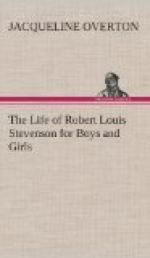At home and at his last school he was always starting magazines. The stories were illustrated with much color and the magazines circulated among the boys for a penny a reading. One was called The Sunbeam Magazine, an illustrated miscellany of fact, fiction, and fun, and another The School Boy Magazine. The latter contained four stories and its readers must have been hard to satisfy if they did not have their fill of horrors—“regular crawlers,” Louis called them. In the first tale, “The Adventures of Jan Van Steen,” the hero is left hidden in a boiler under which a fire is lit. The second is a “Ghost Story” of robbers in a deserted castle.... The third is called, “by curious anticipation of a story he was to write later on, ‘The Wreckers.’”
Numerous plays and novels he began but they eventually found their fate in the trash basket. An exception to this was a small green pamphlet of twenty pages called “The Pentland Rising, a page of history, 1666.” It was published through his father’s interest on the two-hundredth anniversary of the fight at Rullion Green. This event in Scotland’s history had been impressed on his mind by the numerous stories. Cummie had told him of the Covenanters and the fact that they had spent the night before their defeat in the town of Colinton.
From the time he was a little chap, balancing on the limb of an apple-tree in the Colinton garden trying to see what kind of a world lay beyond the garden wall, Louis had had a longing to travel and see sights. This began to find satisfaction now.
His father took him on a trip around the coast of Fife, visiting the harbor lights. The little towns along the coast were already familiar to him by the stories of the past. Dunfermline, where, according to the ballad, Scotland’s king once “sat in his tower drinking blood-red wine”; Kerkcaldy, where the witches used to sink “tall ships and honest mariners in the North Sea”; and “Wemyss with its bat-haunted caves, where the Chevalier Johnstone on his flight from Colloden passed a night of superstitious terrors.”
Later the family made a trip to the English Lakes and in the winter of the same year to the south of France, where they stayed two months, then making a tour through Italy and Switzerland. The following Christmas found Louis and his mother again in Mentone, where they stayed until spring.
French was one of his favorite studies at school, and now after a few months among French people he was able to speak fluently. Indeed, in after life he was often mistaken for a Frenchman.
His French teacher on his second visit to Mentone gave him no regular lessons, but “merely talked to him in French, teaching him piquet and card tricks, introducing him to various French people and taking him to concerts and other places; so, his mother remarks, like Louis’ other teachers at home I think they found it pleasanter to talk to him then to teach him.”




